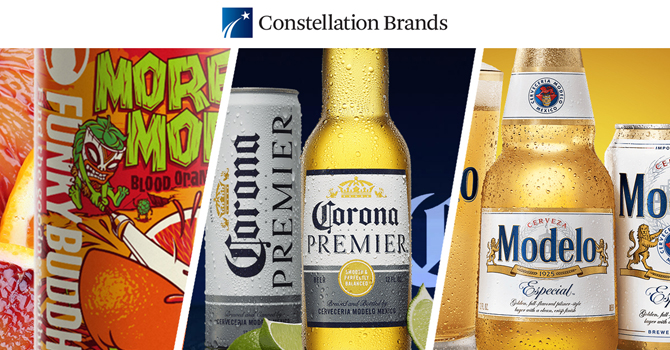
Constellation Brands announced its second quarter fiscal 2018 earnings Thursday morning, which were highlighted by a 12.8 percent increase in net sales over the same three-month period the year before.
Shipments of Constellation Brands’ beer portfolio — which include popular Mexican import labels Corona, Modelo and Pacifico, as well San Diego-based craft brewery Ballast Point — increased 11.7 percent, while depletions (sales-to-retailers) grew 8.1 percent during the quarter, which ended August 31.
“Our second quarter results are a testament to the fact that our total beverage alcohol (TBA) strategy is paying off,” CEO Rob Sands said via a press release. “We remain the leader in the high-end of the U.S. beer market, and we are reaping the benefits our wine and spirits premiumization efforts. Strong execution, coupled with smart portfolio and operational investments, continue to fuel our growth and solidify our leadership position across TBA.”
During a conference call with analyst, Sands called the company’s acquisition of Florida-based Funky Buddha in August “a continuation of our beer strategy to be the leader in the high end of the U.S. beer market.” Sands added that the plan is to grow distribution of the Funky Buddha brand throughout the state of Florida as well as “targeted expansions into key new states.”
“This brand has great potential and plenty of runway for future growth and we plan to leverage that potential to begin building a stronger presence in the high end of craft beer as this market continues to be one of the key growth drivers within the U.S. beer market,” he said.

There was little talk of Constellation Brands’ first craft brewery acquisition, Ballast Point, on the call until an analyst asked Sands what lessons the company is applying from that $1 billion deal to Funky Buddha. (Recall that Constellation Brands recorded an $87 million non-cash “impairment charge” to Ballast Point’s trademarks, essentially suggesting that the company overpaid for the brewery, in the first quarter.)
Sands cited three key lessons.
- Consolidating distribution into Constellation Brands’ so-called “Gold Network” of wholesalers. “If and when we expand it [Funky Buddha] outside of Florida, that will be a key tenant,” he said.
- Focusing on two or three SKUs that are “really driving the growth as opposed to overly fragmenting the portfolio” and then marketing against those products where there is velocity and consumer interest. “That’s another key learning as opposed to just putting out 50 different things,” he said.
- Not expanding the brewery geographic footprint too quickly into markets where there is a lack of consumer awareness or marketing. “As the business has slowed down, as there’s a SKU contraction going on, that modus operandi really doesn’t work anymore,” he said.

Sands said Constellation will apply those lessons to Funky Buddha in order to “build a stronger, more consistent and more measured growth story” as well as Ballast Point. He added that not doing so early is “why you see some of the shorter term negative impacts on Ballast Point.”
“There’s nothing fundamentally wrong it other than the approach that was previously taken was not I’d say the kind of professional approach that we as a major company could really bring to it,” he said. “So we’re in that process right now.”

Other notes from the call:
During the first half of the year, Constellation Brands said it was able to capture “significant share gains” in beer due to shipment and depletion growth rates in the 9 to 10 percent range. In the first quarter, the company reported shipment growth of 7 percent while depletions increased 11.6 percent.
Overall, Constellation Brands said its beer business drove more than 60 percent of the high-end category growth.
The company also touted the performance of its Modelo brand family, which led the company’s beer portfolio during the summer selling season with depletion growth of nearly 20 percent.

Constellation plans a national launch for Corona Premier, the company’s low-calorie challenger to Michelob Ultra, and Corona Familiar “rolling out to all major Hispanic markets” starting in fiscal year 2019, Sands said.
Constellation Brands executive vice president and CFO David Klein cautioned that recent natural disasters “had a minor impact on our Q2 results and may have some minimal impact on Q3 results.”
For fiscal year 2018, Constellation Brands is targeting net sales growth in the 9 to 11 percent range for its beer business.